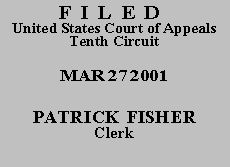

| GARY BOTTOMS,
Petitioner-Appellant, |
|
| v. | |
| JAMES L. SAFFLE, Warden; THE
ATTORNEY GENERAL OF THE
STATE OF OKLAHOMA,
Respondents-Appellees. |
|
Petitioner Gary Bottoms, a state inmate appearing pro se, seeks a certificate of appealability to appeal the district court's dismissal of his 28 U.S.C. § 2254 habeas petition as untimely. We deny a certificate of appealability and dismiss the appeal.
Bottoms was convicted of second degree murder in state court on March 19, 1996. His direct appeal from his conviction and sentence was affirmed on April 15, 1997, and became final on July 14, 1997, after expiration of the ninety-day period for seeking certiorari with the Supreme Court. See Habteselassie v. Novak, 209 F.3d 1208, 1209 (10th Cir. 2000). His application for post-conviction relief in state court was denied on April 27, 2000, and this denial was affirmed on appeal by the Oklahoma Court of Criminal Appeals on July 11, 2000.
Bottoms mailed his habeas petition to the district court on August 8, 2000, and it was filed on August 15, 2000. He filed an amended habeas petition on August 31, 2000. The magistrate judge ordered Bottoms to show cause why his petition should not be summarily dismissed based on expiration of the statute of limitations in 28 U.S.C. § 2244(d), which in this case would have expired on July 13, 1998. After considering Bottoms' response to the order to show cause, the magistrate recommended dismissal of the petition as untimely because it was filed after expiration of the statute of limitations and the record did not support tolling of the limitations period. Bottoms filed objections to the magistrate's report. The district court adopted the magistrate's report and dismissed the petition as untimely.
Before a certificate of appealability can issue, a petitioner must make "a substantial showing of the denial of a constitutional right." 28 U.S.C. § 2253(c)(2). When, as in this case,
the district court denies a habeas petition on procedural grounds without reaching the prisoner's underlying constitutional claim, a COA should issue when the prisoner shows, at least, that jurists of reason would find it debatable whether the petition states a valid claim of the denial of a constitutional right and that jurists of reason would find it debatable whether the district court was correct in its procedural ruling.
Slack v. McDaniel, 120 S. Ct. 1595, 1604 (2000) (emphasis added). Bottoms argues that jurists of reason would find it debatable whether the district court was correct in its procedural ruling. We review de novo the legal basis for the district court's action. See Rogers v. Gibson, 173 F.3d 1278, 1282 (10th Cir. 1999), cert. denied, 528 U.S. 1120 (2000).
After careful review of the entire record, we agree with the magistrate's comprehensive and well-reasoned assessment that Bottoms' habeas petition was untimely and that no tolling was warranted. Absent statutory or equitable tolling, under Section 2244(d) Bottoms' habeas petition was required to be filed on or before July 13, 1998.
We DENY a certificate of appealability and DISMISS this appeal. We DENY the request to proceed in forma pauperis on appeal. The mandate shall
issue forthwith.
Entered for the Court
Mary Beck Briscoe
Circuit Judge
*.This order and judgment is not binding precedent, except under the doctrines of law of the case, res judicata, and collateral estoppel. The court generally disfavors the citation of orders and judgments; nevertheless, an order and judgment may be cited under the terms and conditions of 10th Cir. R. 36.3.